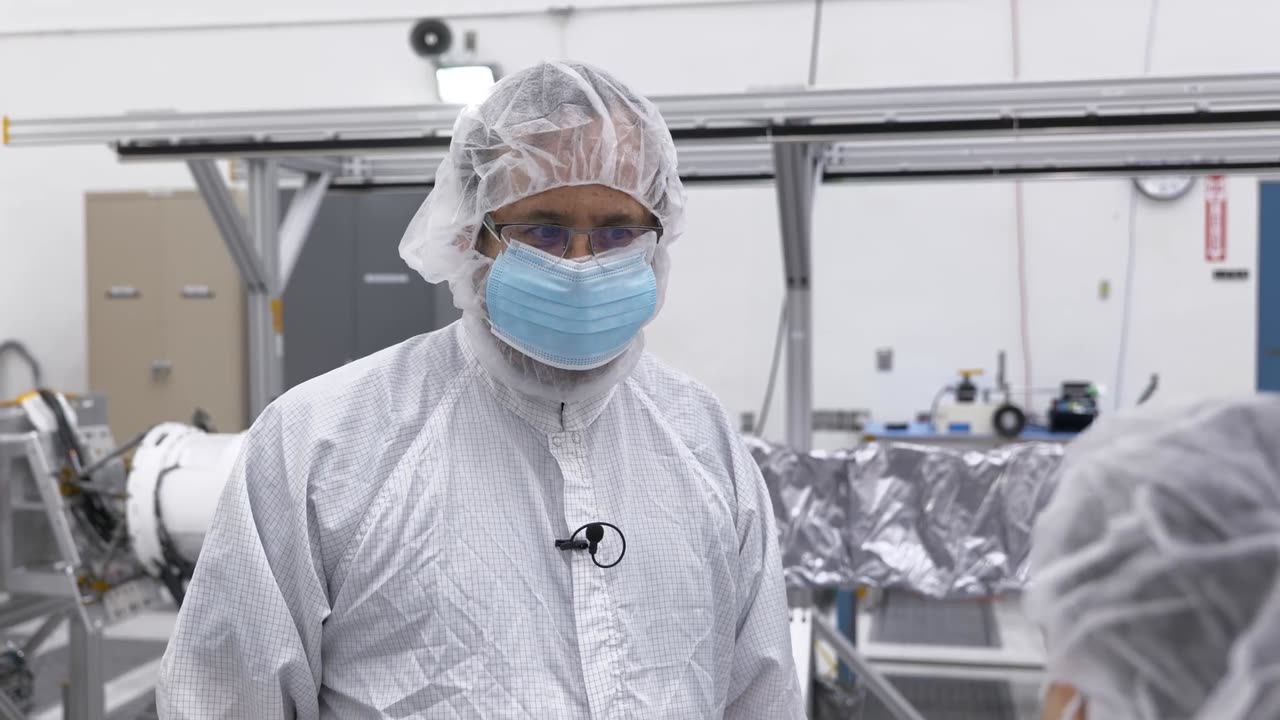Premium Only Content

Spacecraft Makers: Testing Europa Clipper’s Magnetometer
#spacecraft #spacecraftmakers #testingeuropaclippers #europaclippers #magnetometer #nasa #nasaspacemission #nasa2030 #spacecraft2030 #jetpropulsion #launch #jupiter #jupiterexploration #jupiterjourney #spaceexploration #wc1 #wolfchamp
Spacecraft Makers: Testing Europa Clipper’s Magnetometer
Join team members from NASA’s Europa Clipper mission in a clean room at NASA’s Jet Propulsion Laboratory to learn about testing of the spacecraft’s magnetometer, which will help scientists answer the question, “Does Europa have an ocean?”
The magnetometer is made up of a long, 28-foot (6.5-meter) boom and three fluxgate sensors, which are compressed in a canister on the side of the spacecraft until the boom is deployed after launch. The electronics for the instrument are contained in the vault of the spacecraft, along with electronics for the other science instruments.
Spacecraft Makers is a video series that takes audiences behind the scenes to learn more about how space missions, like Europa Clipper, come together. Europa Clipper will explore this icy moon of Jupiter to see if there are conditions suitable for life. Scientists have evidence that a global ocean lies under the moon’s surface, and the mission aims to confirm the existence of the ocean.
The spacecraft needs to be hardy enough to survive a 1.6-billion-mile, six-year journey to Jupiter – and sophisticated enough to perform a detailed science investigation of Europa once it arrives at the Jupiter system in 2030.
Europa Clipper is expected to launch in October 2024 from Kennedy Space Center in Florida.
Spacecraft Makers: Testing Europa Clipper’s Magnetometer
Join team members from NASA’s Europa Clipper mission in a clean room at NASA’s Jet Propulsion Laboratory to learn about testing of the spacecraft’s magnetometer, which will help scientists answer the question, “Does Europa have an ocean?”
The magnetometer is made up of a long, 28-foot (6.5-meter) boom and three fluxgate sensors, which are compressed in a canister on the side of the spacecraft until the boom is deployed after launch. The electronics for the instrument are contained in the vault of the spacecraft, along with electronics for the other science instruments.
Spacecraft Makers is a video series that takes audiences behind the scenes to learn more about how space missions, like Europa Clipper, come together. Europa Clipper will explore this icy moon of Jupiter to see if there are conditions suitable for life. Scientists have evidence that a global ocean lies under the moon’s surface, and the mission aims to confirm the existence of the ocean.
The spacecraft needs to be hardy enough to survive a 1.6-billion-mile, six-year journey to Jupiter – and sophisticated enough to perform a detailed science investigation of Europa once it arrives at the Jupiter system in 2030.
Europa Clipper is expected to launch in October 2024 from Kennedy Space Center in Florida.
Spacecraft Makers: Testing Europa Clipper’s Magnetometer
Join team members from NASA’s Europa Clipper mission in a clean room at NASA’s Jet Propulsion Laboratory to learn about testing of the spacecraft’s magnetometer, which will help scientists answer the question, “Does Europa have an ocean?”
The magnetometer is made up of a long, 28-foot (6.5-meter) boom and three fluxgate sensors, which are compressed in a canister on the side of the spacecraft until the boom is deployed after launch. The electronics for the instrument are contained in the vault of the spacecraft, along with electronics for the other science instruments.
Spacecraft Makers is a video series that takes audiences behind the scenes to learn more about how space missions, like Europa Clipper, come together. Europa Clipper will explore this icy moon of Jupiter to see if there are conditions suitable for life. Scientists have evidence that a global ocean lies under the moon’s surface, and the mission aims to confirm the existence of the ocean.
The spacecraft needs to be hardy enough to survive a 1.6-billion-mile, six-year journey to Jupiter – and sophisticated enough to perform a detailed science investigation of Europa once it arrives at the Jupiter system in 2030.
Europa Clipper is expected to launch in October 2024 from Kennedy Space Center in Florida.
Spacecraft Makers: Testing Europa Clipper’s Magnetometer
Join team members from NASA’s Europa Clipper mission in a clean room at NASA’s Jet Propulsion Laboratory to learn about testing of the spacecraft’s magnetometer, which will help scientists answer the question, “Does Europa have an ocean?”
The magnetometer is made up of a long, 28-foot (6.5-meter) boom and three fluxgate sensors, which are compressed in a canister on the side of the spacecraft until the boom is deployed after launch. The electronics for the instrument are contained in the vault of the spacecraft, along with electronics for the other science instruments.
Spacecraft Makers is a video series that takes audiences behind the scenes to learn more about how space missions, like Europa Clipper, come together. Europa Clipper will explore this icy moon of Jupiter to see if there are conditions suitable for life. Scientists have evidence that a global ocean lies under the moon’s surface, and the mission aims to confirm the existence of the ocean.
The spacecraft needs to be hardy enough to survive a 1.6-billion-mile, six-year journey to Jupiter – and sophisticated enough to perform a detailed science investigation of Europa once it arrives at the Jupiter system in 2030.
Europa Clipper is expected to launch in October 2024 from Kennedy Space Center in Florida.
Spacecraft Makers: Testing Europa Clipper’s Magnetometer
Join team members from NASA’s Europa Clipper mission in a clean room at NASA’s Jet Propulsion Laboratory to learn about testing of the spacecraft’s magnetometer, which will help scientists answer the question, “Does Europa have an ocean?”
The magnetometer is made up of a long, 28-foot (6.5-meter) boom and three fluxgate sensors, which are compressed in a canister on the side of the spacecraft until the boom is deployed after launch. The electronics for the instrument are contained in the vault of the spacecraft, along with electronics for the other science instruments.
Spacecraft Makers is a video series that takes audiences behind the scenes to learn more about how space missions, like Europa Clipper, come together. Europa Clipper will explore this icy moon of Jupiter to see if there are conditions suitable for life. Scientists have evidence that a global ocean lies under the moon’s surface, and the mission aims to confirm the existence of the ocean.
The spacecraft needs to be hardy enough to survive a 1.6-billion-mile, six-year journey to Jupiter – and sophisticated enough to perform a detailed science investigation of Europa once it arrives at the Jupiter system in 2030.
Europa Clipper is expected to launch in October 2024 from Kennedy Space Center in Florida.
-
 1:00:54
1:00:54
The Tom Renz Show
7 hours agoMore Epstein/FBI, a Scary Trade War, & the Dem Echo Chamber
7.49K1 -
 40:43
40:43
Kimberly Guilfoyle
8 hours agoDems Double Down on Delusion-Why? Live with Tony Kinnett & Bo French | Ep.202
77.8K31 -
 1:28:42
1:28:42
Redacted News
6 hours agoBREAKING! SOMETHING BIG IS HAPPENING IN EUROPE ALL OUT WAR IS COMING AGAINST RUSSIA, TRUMP FURIOUS
121K272 -
 47:50
47:50
Candace Show Podcast
6 hours agoBREAKING: Judge Makes Statement Regarding Taylor Swift's Text Messages. | Candace Ep 155
113K112 -
 1:14:23
1:14:23
Josh Pate's College Football Show
3 hours ago $0.29 earnedCFB’s Most Hated Teams | FSU & Clemson Future | Big Ten Win Totals | Star Rankings Overrated?
14.5K -
 1:33:47
1:33:47
CatfishedOnline
5 hours agoGoing Live With Robert - Weekly Recap
27.8K -
 55:18
55:18
LFA TV
1 day agoEurope’s Sudden Turn Against America | TRUMPET DAILY 3.6.25 7PM
32.2K3 -
 4:21
4:21
Tundra Tactical
4 hours ago $2.12 earnedPam Bondi MUST Enforce Due Process NOW!
23.7K1 -
 56:42
56:42
VSiNLive
5 hours agoFollow the Money with Mitch Moss & Pauly Howard | Hour 1
48K1 -
 1:05:32
1:05:32
In The Litter Box w/ Jewels & Catturd
1 day agoShalom Hamas | In the Litter Box w/ Jewels & Catturd – Ep. 756 – 3/6/2025
103K37